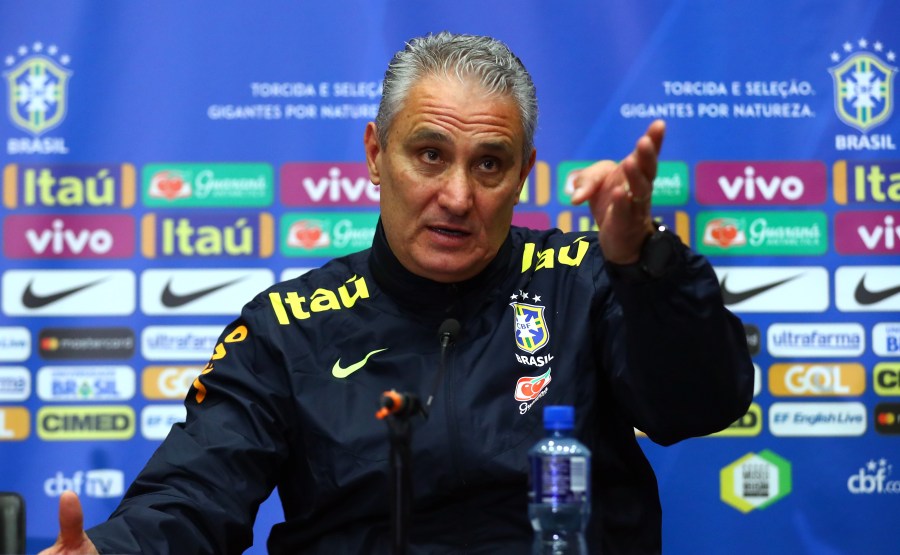Tim Vickery’s Notes from Brazil: What life for Tite after Brazil?
Daniel Alves has played under many of the giant coaches of European football, including Pep Guardiola. But when he was asked by the Brazilian media to name the outstanding coach of his career, he did not hesitate. “It is Tite,” he said.
Of course, opinions of players on their current coaches should always be taken with a pinch of salt. Daniel Alves needs to stay in the good books of the Brazil boss is he going to crown his international career with a World Cup win in Russia.
Nevertheless, the achievements of Tite are undeniable – winning the domestic, continental and world titles with Corinthians in 2011-12 was highly impressive, especially since no South American side has subsequently managed even to be competitive in the Club World Cup. And then, in mid 2016, he took over a Brazil team languishing in 6th place in World Cup qualification, and in real danger of missing out on the competition for the first time ever. Instead, with 10 wins and two draws, 30 goals scored and three conceded, Tite turned the qualification campaign into a victory parade.
“He has strength of personality and character,” says Daniel Alves. “He is able to deal with people in such a way that extracts the best from everyone.”
Part of the success of Tite is clearly down to tactical development. He made his name at the start of the century as a 3-5-2 specialist. But he has never allowed himself to be stuck in a groove. Indeed, the stand out line of Brazil’s qualification campaign was his declaration that “I have learned how to learn.” He acquired the ability to organise a European style 4-4-2 – working with Andres D’Alessansdro at Internacional was important in this process. And in recent years, his intense study of European club football has taught him how to keep his team compact, first to ensure defensive solidity, then in the search for numerical superiority in the opponent’s half of the field.
And, as Daniel Alves makes clear, there is more to Tite than a shrewd tactical brain. There is also the charismatic nature of his communication. Like some captivating hip priest, he speaks with rare conviction, right into the eyes of his interlocutor. The former Uruguay captain Diego Lugano, refers to Tite as a “snake charmer”. This is meant as a criticism – a product of Corinthians v Sao Paulo rivalry – but it also works as an accurate description of the coach’s success in getting his message across.
But how much of this ability is linguistically specific? Or, to use less clumsy words, would Tite’s methods work as well with players who do not speak Portuguese? It is a question with interesting consequences for his career after leaving the Brazil job.
The chances are that he will stay in his current post after Russia 2018. There is always the chance, of course, that things might go badly wrong in Russia. And any result other than final victory will open him up to criticism more fierce than anything he has ever faced. But he should have enough credit stored up to be able to stay in the job, assuming that he wants to do so. It is possible that the biggest chance of his moving on would come if Brazil win the tournament – his two predecessors in this situation, Carlos Alberto Parreira in 1994 and Luiz Felipe Scolari eight years later both decided to quit at the top.
At some point, though, be it in July or in 2022, Tite will cease to be Brazil coach. What will he do then?
Some five years ago when we did a TV programme together, he told me that he could never envisage himself working in another country. He could not, he said, imagine himself capable of achieving excellence in a second language.
There would seem to have been a light softening of his position since then. Like many from the south of Brazil, Tite is of Italian roots. Perhaps, then, a cultural affinity might help him feel at home in Serie A.
And surely his head will have been swayed by the experience of working with such top-class players. Contemporary Brazilian football is unable to hang on to the likes of Neymar, Phillippe Coutinho, Gabriel Jesus, Marquinhos and company. After coaching stars of that quality, going back to Brazilian club football would surely be a let down. The logical step would be to continue the adventure by taking charge of a major European club. Indeed, Brazilian coaches need someone of his calibre to open doors for them. South American coaches have done impressive work all over Europe in recent years. But none of them have been Brazilian.
Is Tite up to the challenge? Or does he think that he can only charm his snakes in Portuguese? The answer may not come for a while, but it should be well worth waiting for.
Don’t forget to follow World soccer on Facebook and Twitter.






